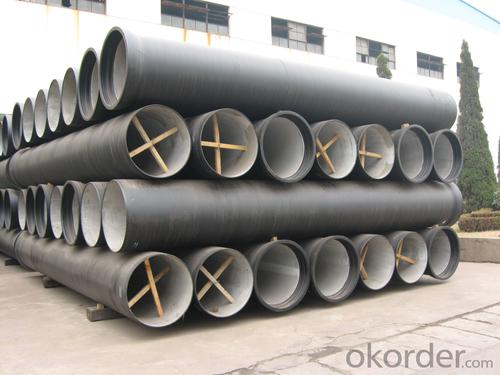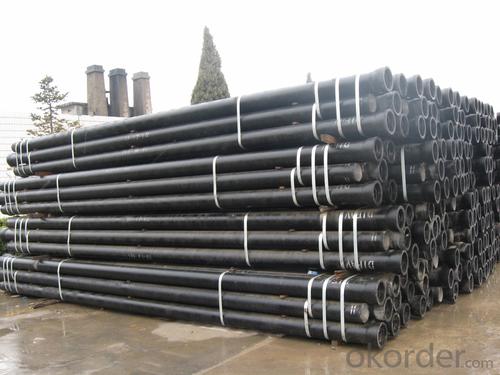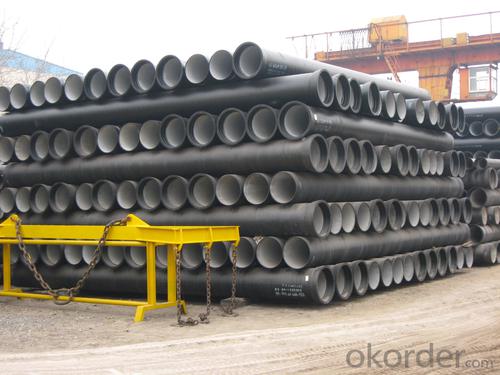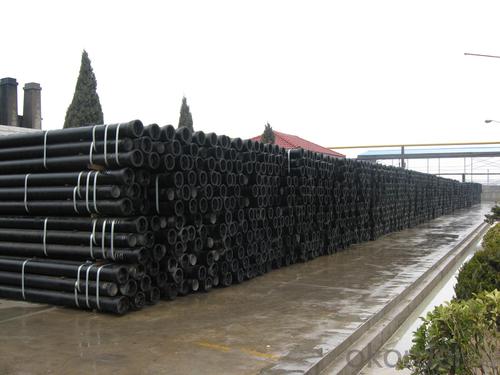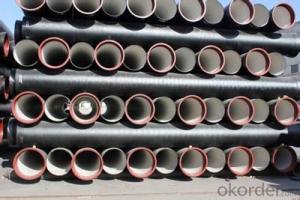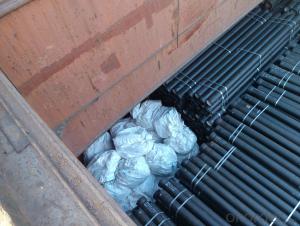DUCTILE IRON PIPE DN600 K8/C
- Loading Port:
- China Main Port
- Payment Terms:
- TT or LC
- Min Order Qty:
- 20 m.t.
- Supply Capability:
- -
OKorder Service Pledge
OKorder Financial Service
You Might Also Like
Specification:
1) The standard of pipe: ISO2531:1998, K9
2) Effective length: 6m
3) Inner cement line: Portland cement line as per ISO4179
4) Zinc coating: at least 130g/m2 as per ISO8179
5) Bitumen painting: at least 70um as per ISO8179
6) With 100% quantity of NBR ring, or SBR ring, or EPDM ring as per ISO4633
7) DN80mm-800mm
8) High strength, lighter than grey iron, good corrosion resistance, no furring, small flow resistance, easy fixing, long life tome about 100 yeas
9) Produced by Hangzhou chunfeng machine
10) Checked by automatic inspection equipment
11) Composition:
Chemical composition | ||||||
Chemical composition | Ductile Cast Iron Pipe (%) | Grey iron pipe (%) | Steel pipe (%) | |||
C | 3.5-4.0 | 3.2-3.8 | 0.1-0.2 | |||
Si | 1.9-2.6 | 1.4-2.2 | 0.15-0.4 | |||
Mn | 0.15-0.45 | 0.4-0.6 | 0.3-0.6 | |||
P | ≤0.06 | ≤0.3 | 0.02-0.03 | |||
S | ≤0.02 | ≤0.1 | 0.02-0.03 | |||
Mg | 0.03-0.06 | |||||
12) Feature:
Mechanical properties | ||||||
Ductile Cast Iron Pipe | Grey Iron Pipe | Steel Pipe | ||||
Tensile Strength(Mpa) | ≥420 | 150-260 | ≥400 | |||
Yield Strength(Mpa) | ≥300 | No Confirmation | No Confirmation | |||
Bending Strength(Mpa) | ≥590 | 200-360 | ≥400 | |||
Elongation (%) | ≥10 | Neglected | ≥18 | |||
Brinell Hardness(HBS) | ≤230 | ≤230 | About 140 | |||
13) T type mechanical joint
14) Packing: in bulk or container
Urban construction pipe, machine structure pipe, agriculture equipment pipe, water and gas pipe, Greenhouse pipe, Scaffolding pipe, Building material tube, Furniture tube, Low pressure fluid tube, Oil pipe, etc
- Q: Is the fire hose capable of using rapid repair joints?
- Lubrication. Edible oil can be used as lubricant and evenly brush on the socket end and rubber ring.
- Q: Can ductile iron pipes be used for stormwater management systems?
- Yes, ductile iron pipes can be used for stormwater management systems. Ductile iron pipes are known for their strength and durability, making them suitable for various applications including stormwater management. These pipes are resistant to corrosion and can withstand high pressure, making them ideal for carrying stormwater runoff. Additionally, ductile iron pipes have a long lifespan, reducing the need for frequent replacements and maintenance. Overall, ductile iron pipes are a reliable choice for stormwater management systems.
- Q: Can ductile iron pipes be used for underground parking lot drainage?
- Yes, ductile iron pipes can be used for underground parking lot drainage. Ductile iron pipes are highly durable, resistant to corrosion, and can withstand heavy loads, making them suitable for underground applications.
- Q: How does ductile iron pipe handle traffic loads and vibrations?
- Ductile iron pipe is known for its excellent strength and flexibility, allowing it to efficiently handle traffic loads and vibrations. Its superior durability and resilience enable it to withstand heavy vehicle traffic without experiencing significant deformation or damage. Additionally, the material's inherent vibration-damping properties help to minimize the transmission of vibrations caused by traffic, ensuring a smoother and quieter flow of traffic. Overall, ductile iron pipe is a reliable and robust choice for managing traffic loads and vibrations effectively.
- Q: What is the wall thickness of K10 grade dn=400 ductile iron pipe?
- Ductile iron pipes mainly called centrifugal ductile iron pipe, it has the properties of nature, iron and steel, excellent corrosion resistance, good ductility, good sealing effect, simple installation, mainly for municipal, industrial and mining enterprises, water supply, gas, oil etc.. Water supply pipe is the first choice, with high cost performance. Compared with the PE pipe, from the installation time, ductile pipe PE pipe installation is simple and rapid, and after the installation of internal and external pressure bearing better tightness and corrosion resistance; from the point of view, ductile pipe sealing better after installation, but also can improve the corrosion resistance of corrosion protection through a variety of means; from the hydraulic performance, because ductile pipe specifications generally refers to the inner diameter of PE pipe diameter specifications generally refers to the same specifications, because under the condition of ductile pipe can achieve greater runoff; from the installation and maintenance cost, ductile pipe have more favorable price. The inner wall of zinc spray, anti-corrosion materials such as cement mortar.
- Q: Can ductile iron pipes be used for stormwater drainage?
- Yes, ductile iron pipes can be used for stormwater drainage. Ductile iron pipes are known for their strength, durability, and ability to withstand heavy loads, making them a suitable choice for various applications, including stormwater drainage systems.
- Q: What is the typical wall thickness of ductile iron pipes?
- The typical wall thickness of ductile iron pipes can vary depending on the specific application and diameter of the pipe. However, in general, ductile iron pipes commonly have a wall thickness ranging from around 0.25 inches to 0.5 inches.
- Q: How many meters does the cast iron water supply pipe dn150,1 tons?
- Centrifugal ductile iron pipe water-cooled metal type centrifuge daira executed by.Dg100 mm following the closed mold mold jacket cooling, more than Dg150rnm with rain type cooling.
- Q: What is the external coating used in ductile iron pipes?
- The external coating used in ductile iron pipes is typically made of a protective material such as zinc or asphalt. These coatings are applied to the surface of the pipe to provide corrosion resistance and protect the iron from the surrounding environment. Zinc coatings, such as hot-dip galvanizing, are commonly used due to their excellent corrosion resistance properties. Asphalt coatings, on the other hand, provide a durable and flexible barrier against corrosion and abrasion. The choice of coating depends on factors such as the intended application, environmental conditions, and the specific requirements of the project.
- Q: What is the process of fusion bonding for ductile iron pipes?
- Ductile iron pipes are joined together through the fusion bonding process, which involves applying heat and pressure to create a strong and long-lasting bond. This technique is commonly used in the construction and installation of underground water, sewer, and gas pipelines. To start the fusion bonding process, the surfaces of the pipes are thoroughly cleaned and prepared. This includes removing any dirt, debris, or rust that could hinder proper bonding. Specialized tools and techniques, such as wire brushing or sandblasting, are often utilized to ensure a clean and smooth surface. Once the surfaces are prepared, the pipes are aligned and securely clamped together. A fusion bonding machine, also known as a fusion welder, is then employed to apply heat and pressure to the joint. The fusion bonding machine consists of heating elements positioned around the joint and a hydraulic system that applies the necessary pressure. The heating elements, typically powered by electricity or gas, are designed to reach high temperatures capable of melting the ductile iron material. As the heat is applied, the ductile iron surfaces soften and fuse together, creating a strong bond. The pressure from the fusion bonding machine ensures that the molten iron flows evenly and uniformly between the joint surfaces, resulting in a seamless connection. The duration of the fusion bonding process varies depending on the size and thickness of the pipes and the specific project requirements. Once the fusion bonding is complete, the joint is allowed to cool and solidify, forming a permanent and leak-proof connection. Fusion bonding offers numerous advantages for ductile iron pipes. It provides a reliable and durable joint that can withstand high pressure, temperature variations, and external loads. The seamless connection also minimizes the risk of leaks, which is particularly important for underground pipelines that transport water, sewage, or gas. Overall, fusion bonding is a widely utilized technique for joining ductile iron pipes, ensuring their structural integrity and longevity in various infrastructure projects.
Send your message to us
DUCTILE IRON PIPE DN600 K8/C
- Loading Port:
- China Main Port
- Payment Terms:
- TT or LC
- Min Order Qty:
- 20 m.t.
- Supply Capability:
- -
OKorder Service Pledge
OKorder Financial Service
Similar products
Hot products
Hot Searches
Related keywords




